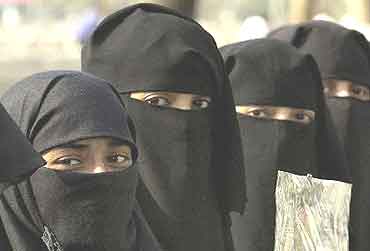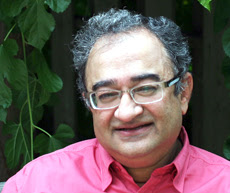 November 1, 2006
November 1, 2006The Shabana Azmi Controversy:
Leading Indian Imam refers to her as the 'Naachne Gaane Waali Aurat'
Outlook India
So what's the song and dance all about? Why is that instead of being felicitated for the honour bestowed on her, Shabana Azmi finds herself in the middle of a controversy? What did she really say about the veil? And what are her critics going on about?
It was a moment of glory for Shabana Azmi as she became the first Indian recipient of the prestigious International Gandhi Peace Prize, after such luminaries in the past as the Dalai Lama and Archbishop Desmond Tutu.
"I am truly overwhelmed and humbled to receive the covetous award. My joy on this occasion has been doubled because Vanessa Redgrave, who has been my hero for many years, both as an actress of immeasurable talent and a woman of tremendous courage who has stuck her neck out of for her political convictions and issues of human rights and social justice, has consented to give me the Award," she had said in her acceptance speech at the House of Commons in London.
"Terrorism is being equated with Islam," she had pointed out: "This is both unjust and untrue. Myths are being perpetuated in the name of religion. Islam resides in more than 50 countries in the world and takes on the culture of the country in which it resides. So it is tolerant in some, liberal in some, extremist in others".
"The fight today cannot be between the Christian and the Muslim, the fight cannot be between the Hindu and the Muslim—the fight needs to be between ideologies—the ideologies of the liberal versus the ideologies of the extremist. The liberal Muslim, Christian, Hindu on the same side against the extremist Muslim, Christian, Hindu on the other," Azmi said in her Gandhi Memorial Lecture 'Non-Violence Is Possible'.
She also spoke on the condition of women in India: "It is true that in India, women on one hand are moving from strength to strength, on the other we also have to confront the horrific violence of female foeticide. It is ironic that a country that worships its women as goddesses also devalues its girl child - denies her access to equal opportunity and is even denying her the right to life. We must put an end to this violence now."
But that was not all. She was confronted with a question on the current veil controversy raging in Britain, and her answer was very simple:
"The Quran speaks about women wearing clothes to cover her modesty. A woman is supposed to cover herself to be modest. She does not need to cover her face. A time has come for a debate on the issue"
Later, in India, when asked to clarify what exactly her views were, she said that while she thinks that the Koran does not explicitly ask women to cover their faces, and they should not be forced to do so as it prevents social interaction and hampers communication, and that Muslims too need to evolve with the times and adapt given the context and situation.
She stressed that for many people, wearing the veil could even be a way of protest against the British policies post-9/11 and that many may just want to make a point of asserting their distinct religious identity. She also took pains to point out that for her issue was that a compulsion of any kind should not be allowed, that no one should be compelled to wear or not wear a veil, and that in addition remarks such as Jack Straw's would make even her to want to cover her face not under one but three veils, just to register her protest.
But she once again reiterated that the time has come for Muslims to debate the issue seriously. Instead of a debate, what followed were usual personal attacks. The first to lead the charge was the Shahi Imam of Jama Masjid, New Delhi, and others including the general secretary of the highly influential Jamiat Ulema-e-Hind followed suit. Prominent Shia clerics and well-known liberals such as Arif Mohammed Khan and Syeda Hameed have spoken out in her favour. A sampling of some of the soundbytes:
Syed Ahmed Bukhari, Imam, Jama Masjid, New Delhi: "Who has authorized Shabana Azmi to interpret the Quran? She is not a Muslim, she is just a 'naachne gaane waali aurat' — a woman who sings and dances — and she should confine herself to her profession and must not speak on things she has no knowledge about. She does not represent the mainstream views within the community. If there is no controversy on Christian nuns wearing a habit, so why should people look for controversy over a Muslim woman wearing a veil? The Quran clearly instructs Muslim women to wear a veil, though it is always up to the followers of any religion how sincerely they follow its principles. Many of our Muslim brethren do take alcohol. But this conduct of theirs does not refute the fact that taking any type of intoxicant is forbidden in Islam. If a woman chooses to move out without a burqa, it would be considered against the tenets of Islam."
Kalbe Sadiq, All India Muslim Personal Law Board: "The Quran only says that the head of a woman and a bit of her face should be covered. There is no need to cover the whole face. There is no mention of the "Talbani purdah" in the Koran. Islam is against the head-to-toe coverings imposed by the Taliban in Afghanistan. The Surah Noor from the Quran demands of a man not to look at the face of a woman and asks him to lower his gaze to protect her modesty."
Khalid Rasheed, Firangimahali, All India Muslim Personal Law Board: "It has become a fashion for some Indian Muslims to criticize the teachings of the holy Quran."
Maulana Mahmood Madani, Rajya Sabha member and general secretary, Jamiat Ulema-e-Hind: "Only Islamic scholars can speak on such issues, Azmi has received no Islamic education, it's only proper for Muslim women to wear veil, what she has said is an offence against Islam. She is talking about a sensitive issue without authority."
Arif Mohammad Khan, former Union minister, BJP: "Islam is against compelling mankind against their will. Islam is against imposition of norms and attitudes. It only expects men and women to dress decently and not to provoke lewdness."
Syeda Hameed, member, Planning Commission: "The modesty code in Islam applies equally to men and women. Islam does not compel women to cover their faces, They are unnecessarily raising a controversy. The clamour against Shabana is an _expression of male bias. Nobody bothers about the Koranic injunctions on how to dress for men. It's ridiculous, women should speak out."
Liberals find much merit in Syeda Hameed's argument that despite there being explicit injunctions on the male way of dressing too, no one seems to be interested in enforcing any dress-code on such well-known Muslim men as any of the Mumbai film industry Khans or sportsmen, but Tennis star Sania Mirza's sporting gear was picked on, just as Shabana Azmi's call for a debate has been sensationalised. It is clear, they point out, that the patriarchal clergy is fighting a desperate battle against modernity's evolutionary onslaught.
In India, so far, any sort of a compulsion has always been frowned upon, even in Kashmir, as Dukhtaran-e-Millat had found out when it tried to enforce a compulsory Talibanesque purdah on the women in the valley. There were not many takers, despite threats of serious bodily harm. Elsewhere in India too, it has been well-established that the veil has more to do with cultural or regional, and less with religious, dimensions.
The traditional ghungat among the Hindu women in Rajasthan and elsewhere, or the non-observance of purdah by many Muslim women, which hardly ever elicits a comment, makes this abundantly clear.
But with Shabana Azmi's intervention, it is clear that the debate over the compulsory veil for the Muslim women has come out of the purdah.



No comments:
Post a Comment